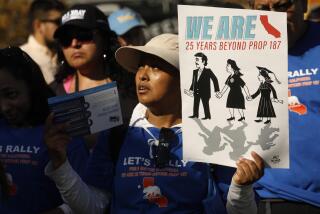Hits and Misses on Immigration : Jordan panel issues new set of reform proposals
- Share via
A national panel headed by former U.S. Rep. Barbara Jordan continues to come up with useful proposals that could help calm the growing hysteria on immigration and lay the groundwork for a rational system of immigration to this country in the 21st Century.
Unfortunately, the most recent recommendations from the Commission on Immigration Reform, made public last week in Washington, seem to have been influenced by the nativist political pressures swirling around this complex and emotional issue.
On the positive side, the Jordan commission firmly acknowledged that this country should continue to accept significant numbers of immigrants and refugees, although under reordered priorities.
The panel proposes that the closest relatives of U.S. citizens and legal residents--minor children and spouses--be given priority for the limited number of entry visas provided each year. Parents of U.S. citizens would get next priority, if their adult children promised to financially support them. Other family-based admission categories, such as for siblings of U.S. citizens, would be eliminated. That should prevent the creation of a backlog of immigration applications by large, extended families of foreigners and end the abuse of the Social Security and Medicare systems by some elderly immigrants. The panel also wisely urged Congress to continue to allow the admission of political refugees and skilled immigrants like artists, athletes and investors.
Unwisely, the commission opted to recommend numerical limits in all these categories--400,000 visas for family members, 100,000 for skilled refugees and 50,000 for other refugees. While seemingly generous, these numbers are purely artificial. What is needed is an immigration system flexible enough to meet a demand that is sure to be higher in some years than in others. Congress should build in such flexibility by revisiting any immigration ceilings every few years. Setting hard and fast numbers may be counterproductive in a fast-changing world. One suspects that the numerical ceilings are a political sop to restrictionists obsessed with setting harsh limits on the entry of foreigners (the most extreme would halt all immigration).
Along the same lines, it is troubling that the commission chose to oppose proposals for an agricultural guest worker program as “a grievous mistake.” Most California farmers would disagree. If the Jordan panel is going to issue such a stark conclusion, it needs to offer a fuller explanation of how it was reached. Knee-jerk opposition is unworthy of a body that has done yeoman work thus far by focusing on the facts about immigration rather than being misled by the myths.
More to Read
Sign up for Essential California
The most important California stories and recommendations in your inbox every morning.
You may occasionally receive promotional content from the Los Angeles Times.










